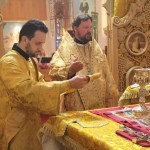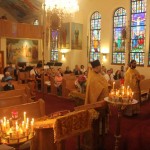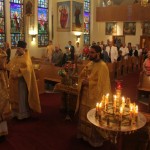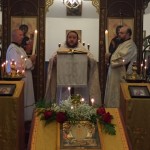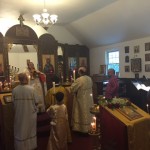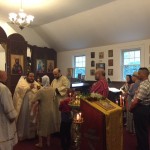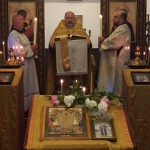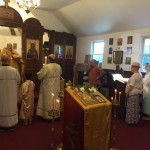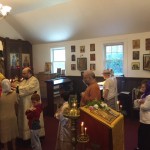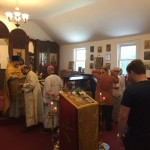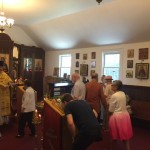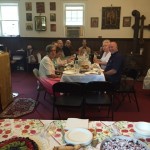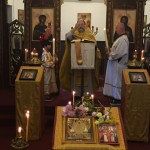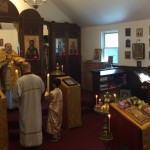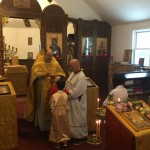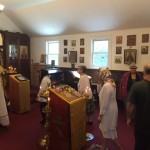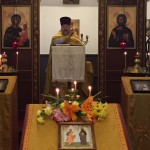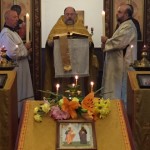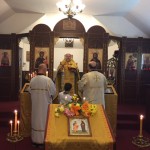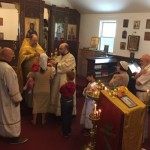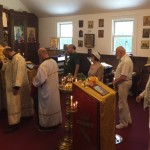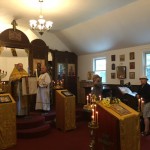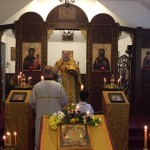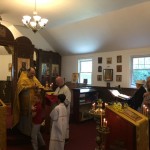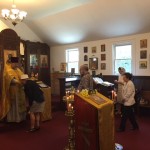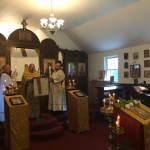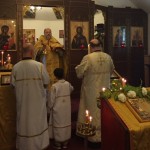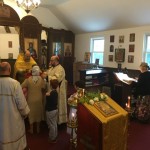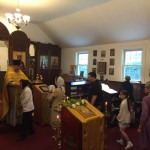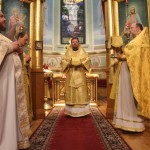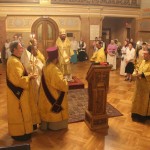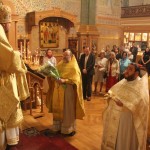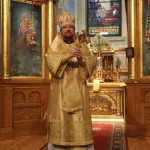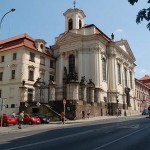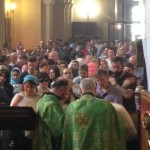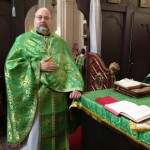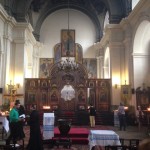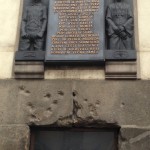On July 17, on the 4th Sunday after Pentecost, Rector of St. George Church, Archpriest Igor Tarasov served the Divine Liturgy in our temple. Following the reading from the Holy Gospel he preached the following homily in English:
“Dear brothers and sisters in Christ! Today’s Gospel is telling us about the healing of the servant of the centurion. Reflecting upon this miracle performed by our Lord Jesus Christ, we may note two things.”
“First of all, the centurion was certainly a good person, for he cared for the health of his servant. He was not one of those who considered human life expendable. He did not say to himself: “My servant is sick, I’ll let him die and tomorrow I will buy another slave at the market to replace him”. Therefore, we may conclude that he was also very serious about his responsibilities towards the one hundred soldiers under his command.”
“The second thing for us to notice is that the centurion’s attitude towards other men is confirmed by his faith in Christ, and in His power to heal. He said to Jesus: “Only speak a word, and my servant will be healed” (Mt. 8, 8). This faith was far greater than that of the Jews. Despite their Old Testament heritage, all that they could do was to criticize, find fault and destroy. The centurion, on the other hand, had complete faith in the power of Christ.”
“Speaking about the centurion we may recall the Saints whose blessed memory we celebrate today, the Royal Passion-bearers of Russia, Emperor Nicholas and his family. Tsar Nicholas had not just one hundred people under his command, but many millions of his subjects, the people of the whole Russian Empire. And he was very serious about his royal responsibilities towards the Russian people. The last Tsar also had a firm faith in the Lord and in the Lord’s power to lead the country. And his faith was greater than the faith of many of his subjects, especially of those who acted to overthrow him. These people had no faith in God. But also those who surrounded the Tsar, those who were supposed to assist him, his ministers, generals and politicians – they did not have such a faith as the last Tsar did. It appeared that all they could do was to criticize, find fault and destroy the Russian Empire. This is why the Emperor Nicholas was forced to renounce his throne and later the whole Royal family was undergoing passions and was murdered by godless people.”
“Going back to think about today’s Gospel, we may see that in return for these qualities our Lord granted the centurion, and so to all the faithful people whom the centurion represents, two things.”
“First, Jesus Christ grants the Kingdom of Heaven to the centurion and to all faithful humanity. The Kingdom is no longer for the Jews only, but it is opened to all. The Lord proclaims: “Many will come from east and west, and sit down with Abraham, Isaac, and Jacob in the kingdom of heaven. But the sons of the kingdom will be cast out into outer darkness” (Mt. 8, 11-12). In other words it is no longer race or nationality that gives salvation, but faith. The Jews took it for granted in a racist way, that they would be saved and not the rest of humanity. But today it is revealed that we shall be judged according to our faith, not according to some external sign of nationality or a color of the skin. From now on, our faith is the one quality that opens the Kingdom of God. No artificial human boundaries and standards serve any purpose any longer, it is faith in the grace and power of God that saves.”
“The second thing is that this Gospel lesson reveals to us that it is faith that determines not only our future in the Kingdom of God, but it also determines our present. Jesus says to the centurion, “As you have believed, so let it be done for you” (Mt. 8, 13). These words are comforting and healing for the people like that centurion. We learn from the Gospel that his servant became healed that same hour (Mt. 8, 13). But these words are terrible for those without faith. They say that as we believe, so shall it be done unto us. If we believe in good things, so we shall receive good things. But if we believe in evil, so we shall receive evil things. Those who live by the virtue shall receive the virtue. And those who live by the vice will receive the vice. “The wages of sin is death”, says St. Paul in today’s Epistle lesson (Rom. 6, 23). Those who live by the sword shall perish by the sword. If we love our neighbor, they will mostly love us. If we hate our neighbor, they will mostly hate us. Our lives are determined by the faith in them. Our lives are determined by our beliefs. Without faith, our lives are empty. With faith, our lives are full.”
“Speaking of the holy Royal Martyrs of Russia we may be wondering why in return for their faith in the Lord and their love towards the Russian people, they were killed by some of those people? The answer is simple: because many of the Russian people stopped to believe in God and began to live by hatred. Many others became the victims of that hatred and godless attitude, including the Royal family.”
“The proper understanding of today’s Gospel lesson proves that our only chance of happiness in this world or our future blessedness in the world to come is to believe in, and so base our lives on, the highest virtues. If we do this, then our lives will be transformed, not only in this earthly life, but also in the life to come. And what is the highest virtue? All mankind will agree that it is Love. And this is the Christian Revelation, in the words of St John the Evangelist, that God is Love.”
“Dear brothers and sisters! Let us shape our lives around the virtue of Love in the firm assurance and knowledge that all else will come aright as a result. For as we believe, so shall it be done unto us.”
Further during the service, before the Holy Communion, the church choir beautifully and prayerfully sang the hymns dedicated to the Royal Passion-bearers.
Following the Liturgy dismissal the Rector made some announcements regarding the future services and parish events.

